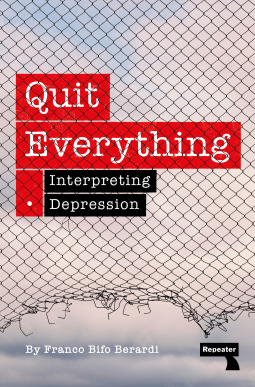
Quit Everything
Interpreting Depression
by Franco Berardi
This title was previously available on NetGalley and is now archived.
Send NetGalley books directly to your Kindle or Kindle app
1
To read on a Kindle or Kindle app, please add kindle@netgalley.com as an approved email address to receive files in your Amazon account. Click here for step-by-step instructions.
2
Also find your Kindle email address within your Amazon account, and enter it here.
Pub Date Aug 13 2024 | Archive Date Sep 19 2024
Repeater Books | Repeater
Talking about this book? Use #QuitEverything #NetGalley. More hashtag tips!
Description
Depression is rife amongst young people the world over. But what if this isn’t depression as we know it, but instead a reaction to the chaos and collapse of a seemingly unchangeable and unliveable future?
In Quit Everything, Franco Berardi argues that this “depression” is actually conscious or unconscious withdrawal of psychological energy and a dis-investment of desire that he defines instead as “desertion”. A desertion from political participation, from the daily grind of capitalism, from the brutal reality of climate collapse, and from a society which offers nothing but chaos and pain.
Berardi analyses why this desertion is on the rise and why more people are quitting everything in our age of political impotence and the rise of the far-right, asking if we can find some political hope in desertion amongst the ruins of a world on the brink of collapse.
Available Editions
| EDITION | Other Format |
| ISBN | 9781915672513 |
| PRICE | $18.95 (USD) |
| PAGES | 207 |
Available on NetGalley
Featured Reviews
 Michael J, Educator
Michael J, Educator
Franco Bifo Berardi has been once of the most provocative, influential and playful theorists of our times, since his writing started appearing in English about 15 years ago. Now as he approaches his mid-70s, he seems to be becoming increasingly depressed, a depression he associates with what he calls precaritization and the inhumanity of late capitalism. This has resulted in Quit Everything. How much you get our of reading the book will depend on how far you accept his assertion in the book's introduction that "Flight, abandonment, inaction, are the only behaviors that I consider ethically acceptable and strategically rational". Being Berardi, his range is wide and ambitious: some will argue with his diagnosis of "generalized autistic syndrome" in society in general; others will be amused by his commandeering of medical and psychological diagnoses for his own ends; still others will be irritated. My assessment is that, although Quit Everything sometimes gives the impression of an essay or article which has been over-extended to book length (with some repetitions), there is enough here to provoke us to thought and (resigned) resistance. Berardi is as ever full of acute observations and characterisations: "We must interpret depression not only as a symptom, but as an agent of subjectivation"; his image of a “Long Covid of the social mind”, and his use of the prescient work of Günther Anders and Mark Fisher are all engaging and thought-provoking.
Being Berardi, he anticipates many of these criticisms, for example in suggesting towards the end of the book that he asks young people who listen to him not to take him too seriously because his theorising is the product of a decaying brain - indeed the book can be read as an investigation of ageing from within. He also suggests that "we have finally reached the point when inactivity is more brainy (and more ethical) than activity", an observation which does not fit well with Berardi's compulsion to keep thinking and writing books like these. How you approach this apparent contradiction and his urgings towards inactivity and resignation, when resistance might be a more appropriate response, will probably colour how you receive his book. I got a lot out of it (as ever).



